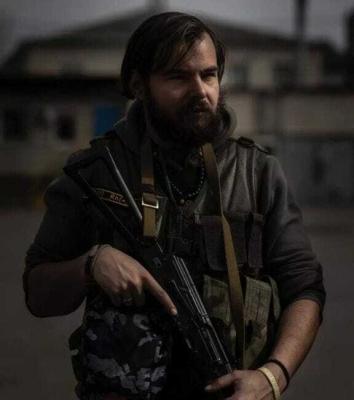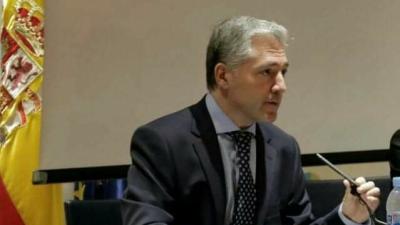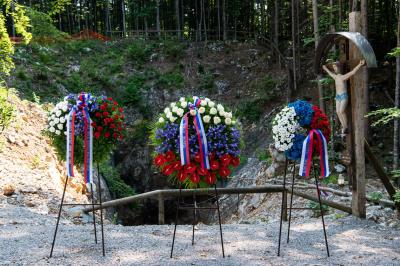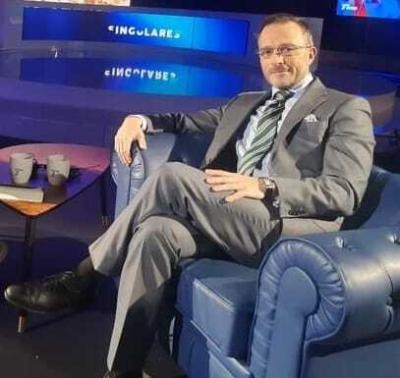Interview with Francisco Floro, Spanish volunteer in Ukraine.
Álvaro Peñas: Why did you go to fight in Ukraine?
Francisco Floro: I went there twice as a military volunteer. What drove me the first time was the desire for adventure and the conviction that the Ukrainian cause was just. The second time, however, it was because I couldn’t get Ukraine out of my mind. I discussed this with a journalist, Fermín Torrano, who was going through the same thing. You can leave Ukraine, but Ukraine doesn’t leave you. Here you feel powerless in the face of what is happening, and there too, because you feel you have to do more for the people who are taking you in and are suffering, but you are just a soldier in a war.
Did you have military experience before coming to Ukraine?
Yes, because I spent a year with the Kurds in Iraq fighting the Islamists. It was in 2021, when the situation was already relatively calm.
Where did you serve?
In my first service I was with a militia during the siege of Kyiv, and then with the internationals in Kharkiv, and in the second I was in the Karpatska Sich battalion between Liman and Kreminna, where I experienced the most difficult combat situations because the unit always had to dance with the ugliest.
In both cases you fought with volunteers from other countries. What brought so many foreigners to fight for Ukraine?
Everything - from adventure through patriotism up to economic reasons. For example, my colleague Peng from the International Legion, who is now fighting in Bajmut, is Taiwanese. He had a future in the financial sector, but after his military service he realised that Taiwan was not ready to face China. He enlisted in the French Foreign Legion and then came to Ukraine because he wanted to be prepared to defending his country. Another case is that of Camacho, a Colombian paramedic, who did not enlist for economic reasons or a desire for adventure like some of his comrades, but out of pure idealism to help Ukrainians.
I was also struck by the number of Belarusians fighting for Ukraine. After the Georgians, they have suffered the most casualties among the international soldiers. Then there are the Russians, but to protect their families and for propaganda reasons there is little information about their casualties. In addition to the well-known Legion of Freedom, there is another unit made up of Russian deserters and there are also the partisans who operate in Russia sabotaging railway networks, fuel depots, etc.
According to the leaked Pentagon documents, there are regular units, mainly British, which are not training the Ukrainians, but are taking part in the fighting. Did you hear rumours of this while you were on the front? What do you think about this?
No. I think there is a lot of deliberate misinformation in all these documents. Frankly, it would be a very risky and unnecessary thing to do because it would escalate the war diplomatically and even militarily, so until hard evidence is published, I don’t give it any credence. At the beginning of the war, and this news is public, several countries sent military personnel to evacuate embassies, but this was logical.
How do you see the war developing, and do you think the announced counter-offensive will be successful?
I am very optimistic about the counteroffensive. I don’t know if the Ukrainians will make it to Melitopol, which would make things very difficult for the Russians, but even if they don’t, there is likely to be a repeat of Kherson. It seems that Ukraine has been reserving forces and would have plenty of material and human resources, while Russia is showing signs of exhaustion. Even Wagner’s leader Prigozhin warns that the number of fresh troops at the ready is enormous.
Moreover, if there is one thing that very much defines the Ukrainians, it is their courage, their steadfastness and their hunger for freedom. There are also other values, which are rare in the West, such as generosity and hospitality.
Of course they have also shown great motivation and patriotism.
If Ukraine had not had this strong motivation, it would have fallen in the first weeks - a motivation that is present not only in the army but also in the population, which is very combative. War was waged on the entire Ukrainian people, they were plunged into darkness and cold in winter, and they were attacked with extreme cruelty. Civilian casualties are probably higher than military casualties, and yet the Ukrainian people are as resilient as their soldiers.
Is it a struggle for survival?
Yes, because when you look at Ukrainian history and see that their identity has always been censored and threatened, you understand that it is indeed a struggle for survival. The Russians claim that there is no recognition of the cultural differences characterizing the Russophone population in the Donbas or other areas, but what I have seen is that it is the Ukrainian culture that is threatened with cancellation and denial by the all-encompassing Russian imperialism. It is not only sovereignty and political independence of Ukraine that is threatened, but also its own identity, so this is a struggle for the survival of the Ukrainian nation, culture and language.
If Ukraine does not win, I truly believe that Putin and his successors would not be satisfied with the territories they have taken from Ukraine, and in the future, they would try again to dominate it through a puppet government or start another expansion war, for example, to get a corridor to Transdniestria, a goal they have already declared. Basically, this invasion is about the reconstruction of the former Soviet space.
Are you going back to Ukraine?
Yes, I have the prospect of joining a new unit and I want to return as soon as possible. For the moment, while I’m still here, I’m doing fundraising work for organisations like United24 (a government organisation that harvests aid in three different areas: health, infrastructure and military), or work with people I trust, like Alexis De Stalle, a French colleague who went to Ukraine as a volunteer, but was not accepted because he had no military experience. However, Alexis stayed to help and spends his time getting equipment for international units. Supplies that save many lives.
When you returned to Spain, were you surprised to see how many people, from left to right, believe everything that Russian propaganda says?
Not really, because I have very little confidence in our society’s judgement. As a rule, we don’t want to know other points of view, but prefer to select the information that confirms our prejudices, regardless of the medium and its lack of credibility. In any case, in the case of Russia, this is a self-destructive stance because Russia seeks our destabilisation. As they have said many times: the West is the enemy.
Read also
José Luis Orella: "The degradation of the national community and society generates weaker, more impressionable and manageable people".
osé Luis Orella is a lecturer in Contemporary History at the CEU San Pablo University, PhD in Contemporary History, specialising in political thought in Spain and Central Europe from the University of Deusto and in Political Law from the UNED.
Álvaro Peñas
The Battle for History
Despite the European Parliament’s condemnation of communist totalitarianism, “progressive” governments try to erase the memory of its victims.
Álvaro Peñas
Rubén Herrero de Castro: “Russia wanted to behave like a superpower, but it is not”.
Interview with Rubén Herrero de Castro, PhD in Political Science and Sociology from the Complutense University of Madrid and Professor of International Relations at the Faculty of Political Science at the same university. He is a researcher at the Franklin Institute of the University of Alcalá de Henares and the Research Unit on Security and International Cooperation. Author of several books, including The Invented Reality.
Álvaro Peñas
Interview with José de Carvalho: 'Portuguese history is not a crime'
José António Ribeiro de Carvalho is a history professor and researcher. A regular contributor to national and regional newspapers on politics, ideology and education, he is the author of several books.














Comments (0)